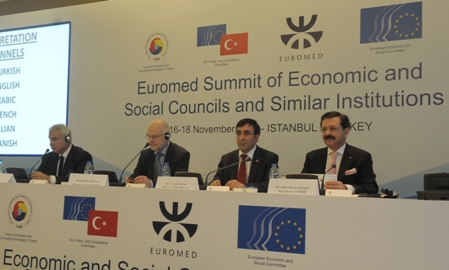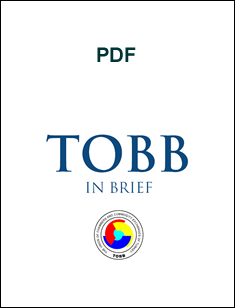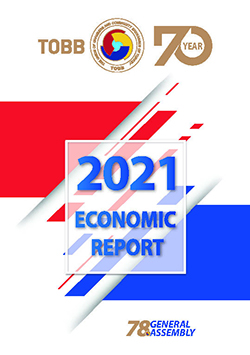“Stability, peace and prosperity in the Mediterranean are to all of our benefit”

16.11.2011 / İstanbul
The Euromed Summit of Economic and Social Councils and Similar Institutions was held in Istanbul with the attendance of the President of the Union of Chambers and Commodity Exchanges of Turkey M. Rifat Hisarcıklıoğlu, Development Minister Cevdet Yılmaz and the President of the European Economy and Social Committee, President Stefan Nilsson.
Speaking at the summit, TOBB President M. Rifat Hisarcıklıoğlu stated that many institutions have made assessments regarding the changes and transformation to the region’s and the world’s economy, going on to say, “We also have a vision. Therefore, with great timing, we are holding this summit.”
Stating that there have been three structural shifts in power over the last five hundred years, TOBB President Hisarcıklıoğlu said, “The complete change of the balance of power has reshaped international politics, economy and cultural life. The first shift in power happened with the rise of the Western World. This process started in the 15th century and sped up dramatically mid-18th century. The main characteristics of this period were science technology, trade, capitalism agriculture and the industrial revolution.
The second important shift started near the end of the 19th century with the rise of the United States of America. We see that during this period USA has significant effect on global economy, politics, science and culture. Now, we are experiencing the third shift in the balance of power. The famous author Ferit Zekeriya called this ‘the rise of the rest.’ During the last 20 years, in various parts of the world, many countries have started rapid economic growth of hitherto unseen rate.”
TOBB President Hisarcıklıoğlu stated that many rising economies are seeing fast growth during a time of global economic crises where many developed countries are experiencing growth, employment and credit problems.
- “The calls for being more democratic are not only for countries but for global institutions as well”
Stating that the number of fast growing countries besides the developed western countries were few, Hisarcıklıoğlu said, “However, in 2010, 85 countries achieved 4% or higher economic growth. Before the economic crisis, in 2006 and 2007, this number had reached 125.
Between 1990-2010, the global economy rose from 22 trillion dollars to 62 trillion dollars. In the same period commerce increased by 267%. Rising economies managed to achieve more than 50% of this growth. 47% of all global commerce was also conducted by rising economies.
Just as countries which are prospering are becoming more democratic global administration structures have become subject to criticism as the global economy becomes more prosperous. Demands for a more democracy are not just for governments but also for global institutions.
This fast and encompassing economic growth has brought an end to the view of many developing countries that they are objects and spectators of an international system. These countries are perceiving themselves more and more as actors and players in the international system, especially the economic system.”
- “The process of change and transformation in Turkey has allowed for the rise of the enterprising middle class”
Relating how, under Turgut Özal’s leadership in the 80’s, he tried to keep pace with this change, TOBB President Hisarcıklıoğlu said, “Turkey at the beginning of the 80’s was very different from the Turkey of today. Turkey’s exports amounted to 3 billion dollars then. The share of agricultural goods and metals in the exports were around 90%. It was the world’s 27th largest economy. Turkey today on the other hand is fast urbanizing. Production has shifted towards high technology products like automobile, machinery, household appliances and electronics. Exports have risen to over 130 billion dollars.
We are still the 17th largest economy in the world and in the next 10 years we aim to become one of the 10 largest economies. The change and transformation in Turkey’s economy has made it possible for the development of the private sector as well as the development of an entrepreneurial middle class. This can be observed via the change in consumption trends in Turkey. There are cities other than Istanbul which have shown extraordinary economic growth in Turkey. Prosperity and riches have started to spread to every part of the country.”
- “I salute the EU leaders of the time who have contributed so much to the transformation process of Turkey”
Stating that the customs union and full membership negotiations starting in 1996 have had a big contribution to Turkey’s economic transformation and change process, Hisarcıklıoğlu stated that salutes the EU leaders of the time for their contributions to the transformation process of Turkey.
Relating how the leaders of the European Union in that period made Europe a center of attraction, Hisarcıklıoğlu said, “A similar leadership is wanted by not just us, but by all people of Europe. The lack of leadership and vision in Europe today would bother the founders of the world’s most successful economic integration model, Shuman, Monnet and Adenauer.”
- “Stability, peace and prosperity in the Mediterranean are to all of our benefit”
Hisarcıklıoğlu went on, “Turkey, especially since the start of the 2000’s, has been living a comprehensive transformation period in politics in addition to its EU accession process. The contribution of democracy, the rule of law, enterprise freedom, liberty of conscience and religion, freedom of speech and public-private sector partnership to this process has been significant.
Likewise, the Europe-Mediterranean Partnership which started with the Barcelona Process in 1995 has been significant for the economic transformations of Mediterranean countries not members of the EU. Especially the Free Trade Agreements signed with the countries of the region have fulfilled an important function in this regard.
I also hold the office of the Vice President of Eurochambres. In this capacity, as Eurochambres we conduct projects to ameliorate the private sector and investment environment of the region’s countries with the financial backing of the EU. The ‘Invest in MED’ project is conducted in this framework. The Barcelona Process changed its name over time, becoming Union for Mediterranean. We must accept that there were doubts and question at the beginning. But in the end we are ready as the Turkish business world to support any initiative to ensure that economic cooperation, commercial partnership, investment, political dialogue to bring countries together.
It is the European Union’s duty to bring the Mediterranean culture into European society in its rightful place. In this regard, the Barcelona Process should be extended to all of the European Union.
The religious and cultural differences in the region should be interpreted as richness and utilized as such. Relations with shores to the south and east of the Mediterranean should be kept well away from excluding and alienating approaches like Islamaphobia in the European Union.
We know that Mediterranean means a shared culture. It is the birthplace of the three major monotheistic religions. It is the melting pot of civilizations and cultures. It is the crossroads of commerce and trade roads. It is the meeting point of three continents. Stability, peace and prosperity in the Mediterranean are to all of our benefit. We, as the business world, consider peace commerce and prosperity together.”
- Development Minister Yılmaz
The Development Minister, Cevdet Yılmaz stated that the credit to national income ratio is easily met as according to the Maastrich criteria and that a low loan level is maintained, “Moreover, a trend of decreasing debt is observable. We foresee debts at around 30% for the next couple of years.”
Minister Yılmaz stated that this isn’t and intergovernmental summit but an international platform bring together NGOs, business worlds and syndicates, saying that NGOs are gaining global status.
Cevdet Yılmaz stated that he wished to see the Mediterranean region as a region of peace and stability in the 21st century, saying, “I am sure that we all share the vision of Mediterranean as a free region.”
Touching on the economic developments achieved by Turkey, Yılmaz emphasized that it was one of the most prominent countries of the region.
Turkey, an important actor in the region has become a critical country in the global crisis and the region’s political transformation stated Yılmaz and said that Turkey is one of the few countries which have successfully steered its economy during the crisis.
Recalling that Turkey bases its goals on the solid foundation of its 2023 aim, Yılmaz said that the goal of becoming one of the 10 largest economies in the world is a shared vision of all parts of the society.
Pointing out the place of women in society, Yılmaz said that a plan of development which did not have women participating in social and economic life could not be conceived, and stated that they valued the interaction of women entrepreneurships and NGOs throughout the Mediterranean region.
- A message from the Republic President Abdullah Gül
President of the Republic Abdullah Gül stated that a strong, dynamic reform towards democracy was in effect in the Mediterranean basin.
Gül sent a message to the “Europe-Mediterranean Economic and Social Councils and Similar Institiutions Sumit.”
In his message, President Gül emphasized that the summit isn’t just contributing to the development of civil society in the Europe-Mediterranean basin, but also in discussions concerning the future, such as global warming to the global financial crisis.
Stressing that ensuring stability and prosperity in the Europe-Mediterranean basin, turning it into a region of peace is a shared goal, Gül said that the summit has been working to this end since the day it was established.
The change and democratic transformation movement that started in North Africa and quickly spread to Middle East countries has brought the region to an important threshold in history stated Gül and said, “That, this transformation is converted into peace, stability and prosperity for the region is crucial.
The need for regional cooperation is felt more now than ever under present circumstances and the responsibility is great. A strong reform dynamic aimed at democracy is in effect in the Mediterranean basin.
Even though every country may have its own history and cultural properties; a system of government which is respectful to human rights, founded on the rule of law, transparent and accountable reflects the rightful and shared expectation of the peoples of the region.
If this process is successful in reaching completion, the European-Mediterranean basin countries will have come together in terms of values as closely as they are georgraphically.
The peace which will surface in the region will no doubt also contribute immensely to the peoples of the African-Eurasian region.”
Abdullah Gül stated that civil society represents the core of participatory democracy and pointed out the importance of the roles everyone attending the summit in regards to the future of their countries and the European-Mediterraenan basin as a whole.
Your message has been sent
Thank you |




